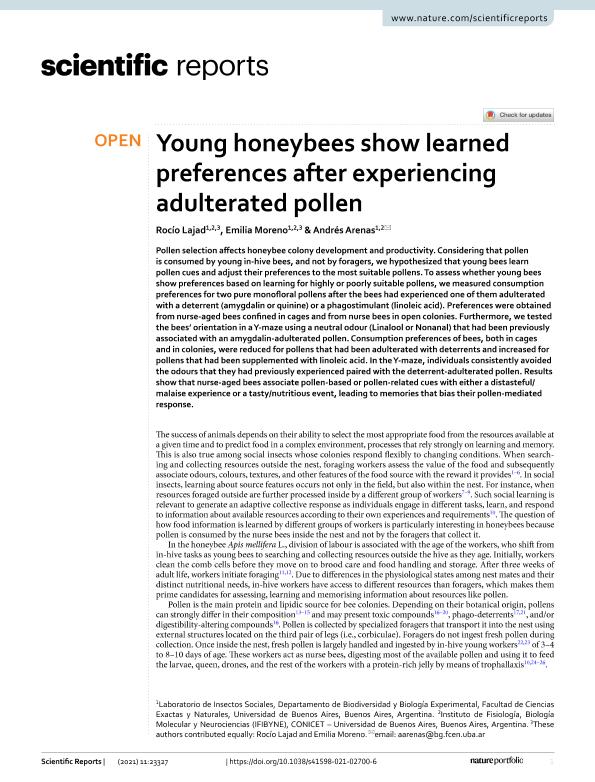Mostrar el registro sencillo del ítem
dc.contributor.author
Lajad, Rocio

dc.contributor.author
Moreno Coellar, Emilia

dc.contributor.author
Arenas, Andres

dc.date.available
2022-10-28T11:16:28Z
dc.date.issued
2021-12
dc.identifier.citation
Lajad, Rocio; Moreno Coellar, Emilia; Arenas, Andres; Young honeybees show learned preferences after experiencing adulterated pollen; Nature; Scientific Reports; 11; 1; 12-2021; 1-11
dc.identifier.issn
2045-2322
dc.identifier.uri
http://hdl.handle.net/11336/175299
dc.description.abstract
Pollen selection affects honeybee colony development and productivity. Considering that pollen is consumed by young in-hive bees, and not by foragers, we hypothesized that young bees learn pollen cues and adjust their preferences to the most suitable pollens. To assess whether young bees show preferences based on learning for highly or poorly suitable pollens, we measured consumption preferences for two pure monofloral pollens after the bees had experienced one of them adulterated with a deterrent (amygdalin or quinine) or a phagostimulant (linoleic acid). Preferences were obtained from nurse-aged bees confined in cages and from nurse bees in open colonies. Furthermore, we tested the bees’ orientation in a Y-maze using a neutral odour (Linalool or Nonanal) that had been previously associated with an amygdalin-adulterated pollen. Consumption preferences of bees, both in cages and in colonies, were reduced for pollens that had been adulterated with deterrents and increased for pollens that had been supplemented with linoleic acid. In the Y-maze, individuals consistently avoided the odours that they had previously experienced paired with the deterrent-adulterated pollen. Results show that nurse-aged bees associate pollen-based or pollen-related cues with either a distasteful/malaise experience or a tasty/nutritious event, leading to memories that bias their pollen-mediated response.
dc.format
application/pdf
dc.language.iso
eng
dc.publisher
Nature

dc.rights
info:eu-repo/semantics/openAccess
dc.rights.uri
https://creativecommons.org/licenses/by/2.5/ar/
dc.subject
Honeybee
dc.subject
Pollen
dc.subject
Learning
dc.subject
young workers
dc.subject.classification
Zoología, Ornitología, Entomología, Etología

dc.subject.classification
Ciencias Biológicas

dc.subject.classification
CIENCIAS NATURALES Y EXACTAS

dc.title
Young honeybees show learned preferences after experiencing adulterated pollen
dc.type
info:eu-repo/semantics/article
dc.type
info:ar-repo/semantics/artículo
dc.type
info:eu-repo/semantics/publishedVersion
dc.date.updated
2022-09-23T14:24:25Z
dc.journal.volume
11
dc.journal.number
1
dc.journal.pagination
1-11
dc.journal.pais
Alemania

dc.description.fil
Fil: Lajad, Rocio. Consejo Nacional de Investigaciones Científicas y Técnicas. Oficina de Coordinación Administrativa Ciudad Universitaria. Instituto de Fisiología, Biología Molecular y Neurociencias. Universidad de Buenos Aires. Facultad de Ciencias Exactas y Naturales. Instituto de Fisiología, Biología Molecular y Neurociencias; Argentina
dc.description.fil
Fil: Moreno Coellar, Emilia. Consejo Nacional de Investigaciones Científicas y Técnicas. Oficina de Coordinación Administrativa Ciudad Universitaria. Instituto de Fisiología, Biología Molecular y Neurociencias. Universidad de Buenos Aires. Facultad de Ciencias Exactas y Naturales. Instituto de Fisiología, Biología Molecular y Neurociencias; Argentina
dc.description.fil
Fil: Arenas, Andres. Consejo Nacional de Investigaciones Científicas y Técnicas. Oficina de Coordinación Administrativa Ciudad Universitaria. Instituto de Fisiología, Biología Molecular y Neurociencias. Universidad de Buenos Aires. Facultad de Ciencias Exactas y Naturales. Instituto de Fisiología, Biología Molecular y Neurociencias; Argentina
dc.journal.title
Scientific Reports
dc.relation.alternativeid
info:eu-repo/semantics/altIdentifier/doi/http://dx.doi.org/10.1038/s41598-021-02700-6
Archivos asociados
